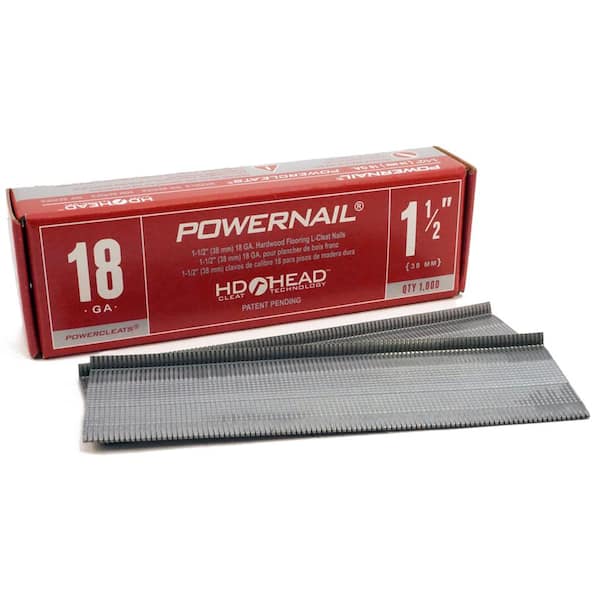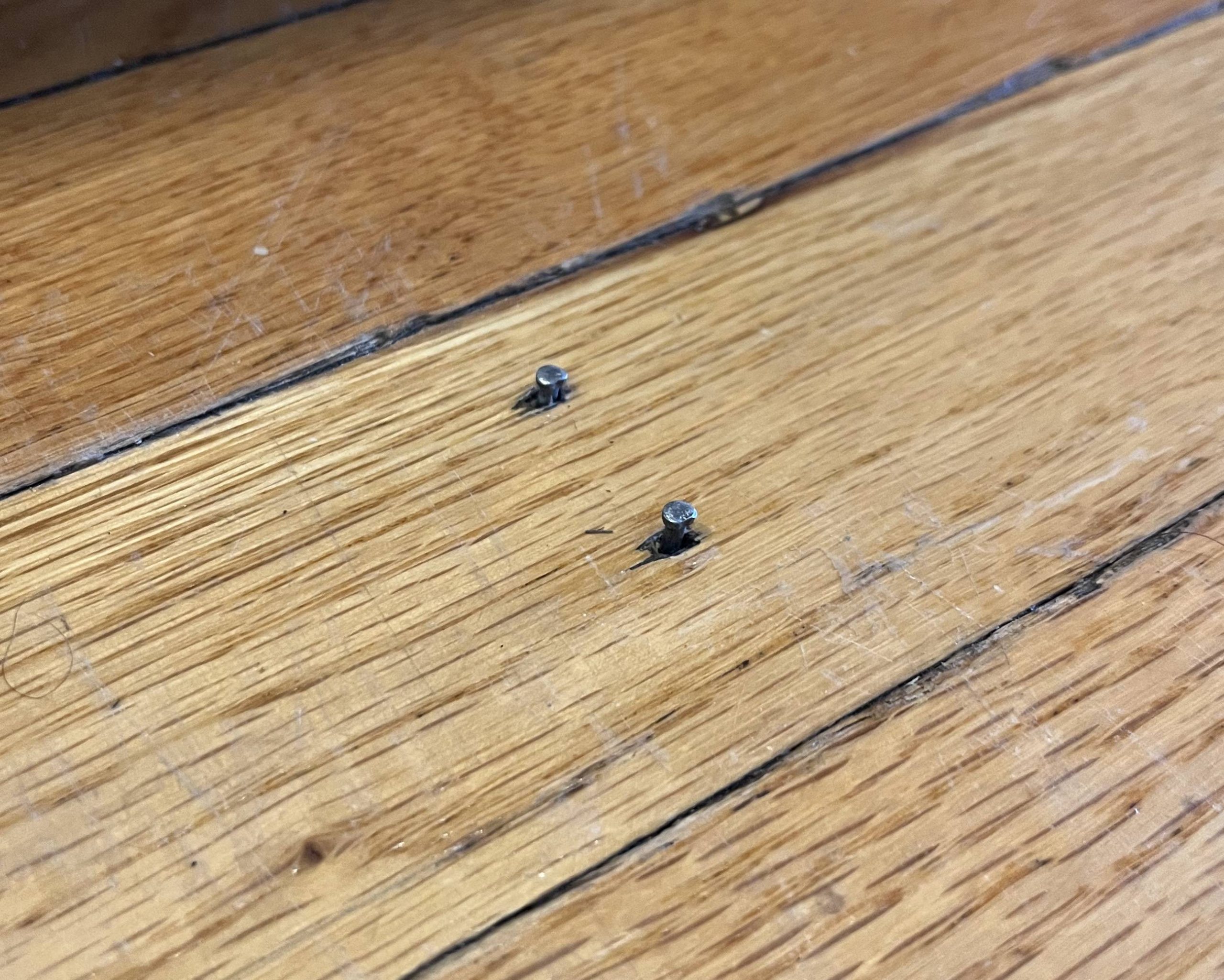Use 2-inch nails for hardwood flooring. They provide the necessary support and strength for the installation process.
Hardwood flooring adds beauty and durability to any space. Whether you’re renovating your home or building a new one, selecting and installing the right nails is crucial for a successful hardwood flooring project. The size of the nails plays a significant role in the stability and longevity of the floor.
Using the correct length and gauge ensures proper attachment without causing damage or compromising the structural integrity. This article will guide you on the ideal size of nails required for hardwood flooring, allowing you to make informed decisions and achieve professional results.
Understanding The Role Of Nail Size In Hardwood Flooring Installation
The correct nail size plays a crucial role in the successful installation of hardwood flooring. It is important to select the appropriate nail size to ensure a strong and durable bond between the hardwood planks and the subfloor.
Using the wrong nail size can have detrimental effects on the hardwood flooring. If the nails are too small, they may not provide enough holding power and can result in loose or squeaky floorboards. On the other hand, using nails that are too large can cause splitting or cracking of the hardwood planks, compromising the aesthetics and structural integrity of the flooring. It can also lead to difficulties during installation and make repairs or replacements more challenging.
It is recommended to consult with a flooring professional or refer to the manufacturer’s guidelines to determine the appropriate nail size for your particular hardwood flooring. By selecting the correct nail size, you can ensure a secure and long-lasting installation, avoiding costly repairs or replacements in the future.

Credit: www.homedepot.com
Factors To Consider When Choosing Nail Size For Hardwood Flooring
Choosing the right nail size for hardwood flooring is crucial for installation. Factors to consider include the thickness of the flooring, subfloor material, and the type of nail gun being used. It is important to ensure that the nails are long enough to secure the boards properly without splitting them.
Finding the right size nails for hardwood flooring installation can significantly impact the success and durability of the project. Here are some factors to consider: 1. Wood species and thickness: Different wood species and thickness require different nail sizes. For instance, thinner wood might require shorter nails to avoid splitting, while thicker wood may need longer nails for proper penetration and stability. 2. Subfloor material: The material of the subfloor should also be taken into account. For a plywood subfloor, you’ll typically use nails around 2 inches in length. However, for a concrete subfloor, you’ll require specialized tools like a powder-actuated nailer or concrete nails. 3. Specific installation method: The chosen installation method also affects the nail size. For face nailing, where nails are hammered at an angle through the face of the plank, longer nails are recommended. However, for blind nailing or using a nail gun, shorter nails are usually preferred. Remember, before finalizing the nail size, it’s always advisable to consult the manufacturer’s guidelines or seek professional advice. By carefully considering these factors, you can ensure a seamless and long-lasting hardwood flooring installation.16-gauge Nails For Solid Hardwood Flooring
16-gauge nails are a popular choice for installing solid hardwood flooring due to their strength and durability. These nails have a thickness or gauge of 16, making them suitable for holding hardwood planks securely in place.
The characteristics of 16-gauge nails make them an ideal option for hardwood flooring installation. They are sturdy and can withstand the expansion and contraction that occurs with temperature changes. Additionally, their larger size provides better holding power, reducing the likelihood of the planks shifting or coming loose over time.
These nails are commonly used in various applications, including installing solid hardwood flooring on both subfloors and concrete slabs. They are particularly suitable for thicker hardwood planks and engineered wood flooring.
Advantages of using 16-gauge nails include their ability to provide strong and reliable support, preventing the floor from squeaking or developing gaps. Moreover, due to their larger size, they are less prone to bending or breaking during installation.
However, one disadvantage of 16-gauge nails is that they can sometimes cause splitting in thinner or more delicate hardwoods. It’s important to take this into consideration and choose the appropriate nail size for your specific flooring material.
18-gauge Nails For Engineered Hardwood Flooring
18-gauge nails are commonly used for installing engineered hardwood flooring due to their versatility and strength. They offer numerous benefits but also have a few drawbacks to consider before making a decision.
- 18-gauge nails are relatively thinner, making them less likely to split the hardwood planks during installation.
- They are available in various lengths, allowing for customization based on the thickness of the flooring material.
- These nails are compatible with most nail guns, making the installation process efficient and convenient.
- They provide a secure and stable hold, preventing the hardwood flooring from shifting or squeaking over time.
- Their thinner profile reduces the risk of visible nail holes after installation.
- They are cost-effective, making them a popular choice among both professionals and DIY enthusiasts.
- Due to their thinner size, they may not be suitable for heavy-duty applications or solid hardwood flooring.
- Compared to thicker nails, they may not have the same level of holding power and resistance.
- In some cases, the thinner nails may require additional reinforcement or adhesive to ensure optimal stability.
- Start by aligning the hardwood plank against the subfloor, ensuring a snug fit.
- Position the nail gun at a 45-degree angle above the tongue of the plank.
- Gently tap the nail gun to insert the 18-gauge nail into the tongue at regular intervals.
- Repeat the process for the remaining planks, ensuring consistent spacing between each nail.
Other Nail Sizes For Specialized Flooring Situations
When installing hardwood flooring, it’s important to choose the right nail size to ensure a secure and durable installation. While standard nails are commonly used, there are other specialized scenarios where alternative nail sizes are needed.
Factors influencing the use of alternative nail sizes:
| Subheading: Specific scenarios where alternative nail sizes are needed | Subheading: Tips for selecting the appropriate nail size |
| 1. Installing engineered hardwood floors | 1. Consider the thickness and hardness of the flooring material |
| 2. Installing over radiant heat systems | 2. Check the manufacturer’s recommendations |
| 3. Installing in high-moisture areas like bathrooms or basements | 3. Determine the subfloor material and condition |
| 4. Installing on top of existing flooring | 4. Assess the type and thickness of the existing flooring |
In these scenarios, it’s essential to select the appropriate nail size based on the specific requirements. Thicker and harder flooring materials may require longer and heavier gauge nails, while engineered hardwood floors may need shorter and thinner nails to prevent potential damage.
For additional guidance on choosing the right nail size, checking the manufacturer’s recommendations and consulting with flooring professionals can be beneficial. Taking into account the factors discussed above will help ensure a successful hardwood flooring installation for any specialized situation.
Proper Nail Placement And Spacing
Achieving proper nail placement and spacing is crucial when installing hardwood flooring. Choosing the right size nails ensures a secure and long-lasting installation without causing any damage to the planks.
Correct nail placement and spacing are crucial when installing hardwood flooring as they ensure the durability and stability of the floor. One of the main considerations is the importance of correct nail placement. Proper placement prevents the hardwood planks from splitting and keeps them securely fastened to the subfloor.
Another aspect to consider is the guidelines for nail spacing. Manufacturers often recommend specific spacing measurements based on the thickness and width of the floorboards. These guidelines prevent gaps from forming between the planks over time and help maintain the integrity of the installation.
To avoid common issues, it is essential to use proper techniques. Pre-drilling pilot holes before nailing can prevent the wood from splitting. Furthermore, staggering the nails and ensuring they are driven at the correct angle can enhance the overall stability of the floor.
Nail Length Considerations
When installing hardwood flooring, it is crucial to choose the right nail length to ensure a strong and secure hold. Determining the ideal nail length depends on several factors. Firstly, the thickness of the hardwood flooring is a key consideration. Thicker flooring materials will require longer nails to penetrate and secure the planks effectively. Secondly, the subflooring material plays a role in nail length selection. Different subfloor materials may require different nail lengths to achieve optimal stability. Lastly, adjusting the nail length for specific installation scenarios is necessary. For instance, near the end of a plank, a shorter nail may be needed to prevent splitting. Additionally, ensuring optimal holding power is essential. Using nails that are too short may result in loose or squeaky boards, while nails that are too long may cause the wood to split. Ultimately, by carefully considering these factors, you can select the right nail length for your hardwood flooring installation.
Additional Tips For Successful Nail Installation
For a successful nail installation, it is important to consider a few additional tips. These tips will ensure that your hardwood flooring is securely attached and will withstand the test of time. Pre-drilling holes for nails is recommended to prevent splitting and cracking of the wood. This can be done using a drill bit that is slightly smaller than the nail diameter.
When it comes to the actual nailing process, you have two options: using a nail gun or manual nailing. Using a nail gun can save you time and effort, as it quickly and efficiently drives nails into the floor. However, if you prefer manual nailing, make sure to use a hammer with a rubber mallet to protect the flooring from damage.
Regardless of the method you choose, avoiding mistakes during the nailing process is crucial. Take care not to hit the boards too hard, as this can cause dents and damage. Additionally, make sure to use the correct size nails for hardwood flooring, as using nails that are too short or too long can compromise the integrity of the floor.
Frequently Asked Questions On What Size Nails For Hardwood Flooring
What Gauge Nails To Use For Hardwood Flooring?
For hardwood flooring, it is recommended to use 16-gauge nails.
Can You Use 18 Gauge Nails For Hardwood Floors?
Yes, you can use 18 gauge nails for hardwood floors.
What Are The Best Nails For Hardwood Floors?
The best nails for hardwood floors are specifically designed flooring nails that are made of high-quality and durable materials. These nails provide a secure and long-lasting hold without damaging the wood. It is important to choose the right size and type of nail for your hardwood floors to ensure proper installation and prevent any potential issues.
What Kind Of Nails To Use On Floor Boards?
Use flooring nails for floor boards as they are specifically designed for the task. These nails have a specialized shape and coating to provide optimal hold and prevent splitting. Opt for nails with a ring or helical shank for improved stability.
Conclusion
To ensure the installation of hardwood flooring is a success, choosing the right size nails is crucial. By understanding the specific requirements of your flooring project, you can make informed decisions about the size and length of the nails. This will help prevent any potential damage or problems that may arise.
Remember, each flooring type may have its own specific recommendations, so be sure to consult the manufacturer’s guidelines or seek professional advice. Installing hardwood flooring is a significant investment, and using the appropriate nails will ensure longevity and durability for years to come.





Leave a Reply